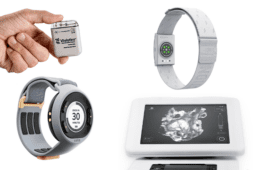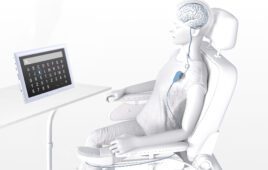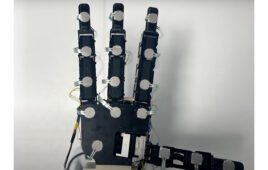Scientists at Wake Forest Baptist Medical Center and the University of Southern California (USC) have demonstrated the successful implementation of a prosthetic system that uses a person’s own memory patterns to facilitate the brain’s ability to encode and recall memory.
In the pilot study, published in today’s Journal of Neural Engineering, participants’ short-term memory performance showed a 35 to 37 percent improvement over baseline measurements.
“This is the first time scientists have been able to identify a patient’s own brain cell code or pattern for memory and, in essence, ‘write in’ that code to make existing memory work better, an important first step in potentially restoring memory loss,” said the study’s lead author Robert Hampson, Ph.D., professor of physiology/pharmacology and neurology at Wake Forest Baptist.
The study focused on improving episodic memory, which is the most common type of memory loss in people with Alzheimer’s disease, stroke and head injury. Episodic memory is information that is new and useful for a short period of time, such as where you parked your car on any given day. Reference memory is information that is held and used for a long time, such as what is learned in school.
The researchers enrolled epilepsy patients at Wake Forest Baptist who were participating in a diagnostic brain-mapping procedure that used surgically implanted electrodes placed in various parts of the brain to pinpoint the origin of the patients’ seizures. Using the team’s electronic prosthetic system based on a multi-input multi-output (MIMO) nonlinear mathematical model, the researchers influenced the firing patterns of multiple neurons in the hippocampus, a part of the brain involved in making new memories in eight of those patients.
First, they recorded the neural patterns or ‘codes’ while the study participants were performing a computerized memory task. The patients were shown a simple image, such as a color block, and after a brief delay where the screen was blanked, were then asked to identify the initial image out of four or five on the screen.
The USC team led by biomedical engineers Theodore Berger, Ph.D., and Dong Song, Ph.D., analyzed the recordings from the correct responses and synthesized a MIMO-based code for correct memory performance. The Wake Forest Baptist team played back that code to the patients while they performed the image recall task. In this test, the patients’ episodic memory performance showed a 37 percent improvement over baseline.
In a second test, participants were shown a highly distinctive photographic image, followed by a short delay, and asked to identify the first photo out of four or five others on the screen. The memory trials were repeated with different images while the neural patterns were recorded during the testing process to identify and deliver correct-answer codes.
After another longer delay, Hampson’s team showed the participants sets of three pictures at a time with both an original and new photos included in the sets, and asked the patients to identify the original photos, which had been seen up to 75 minutes earlier. When stimulated with the correct-answer codes, study participants showed a 35 percent improvement in memory over baseline.
“We showed that we could tap into a patient’s own memory content, reinforce it and feed it back to the patient,” Hampson said. “Even when a person’s memory is impaired, it is possible to identify the neural firing patterns that indicate correct memory formation and separate them from the patterns that are incorrect. We can then feed in the correct patterns to assist the patient’s brain in accurately forming new memories, not as a replacement for innate memory function, but as a boost to it.
“To date we’ve been trying to determine whether we can improve the memory skill people still have. In the future, we hope to be able to help people hold onto specific memories, such as where they live or what their grandkids look like, when their overall memory begins to fail.”
The current study is built on more than 20 years of preclinical research on memory codes led by Sam Deadwyler, Ph.D., professor of physiology and pharmacology at Wake Forest Baptist, along with Hampson, Berger and Song. The preclinical work applied the same type of stimulation to restore and facilitate memory in animal models using the MIMO system, which was developed at USC.




